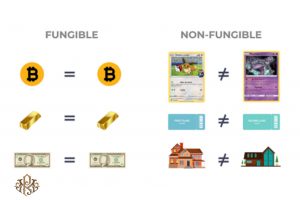
Close



In the cryptocurrency industry, tokens can exist for any sort of service or good. For instance, payment tokens are the currency used to complete transactions in the digital realm, such as Bitcoin or Litecoin (LTC).
Fungible and nonfungible tokens, which are the two most different forms of tokens, are covered in this article.
an NFT (non-fungible token) is regarded as a smart contract that is regulated and digitally secured using open-source platforms but to understand better we need to get familiarized with the concepts of fungible tokens and non-fungible tokens first.
Fungible is the ability to exchange an asset with similar assets without losing its value. For instance, $1 is equal in value to another $1. In other words, Fungible tokens or assets are divisible and non-unique. These tokens are suitable for cryptocurrencies because fungibility is actually a key characteristic of all currencies.
On the other hand, nonfungible assets are unique and undividable. They ought to be regarded as a specific kind of title of ownership for an exclusive, one-of-a-kind object. For instance, an airline ticket is nonfungible because its unique data prevents there from being another of the same sort. Because they are unique, a home, a boat, or a vehicle are nonfungible physical assets.
The same remains true for nonfungible tokens, which stand in for a single, distinctive, and undivided thing, whether it be material (like an image) or intangible (like intellectual property). The underlying technology of blockchain makes it simple to establish ownership of an immaterial digital object.

The two have a pretty clear distinction between them. Imagine the fungible tokens as digital, decentralized versions of the cash you have in your wallet. Simply said, fungible tokens may be used in place of one another. For instance, if you and a buddy each own one bitcoin, they can be used in place of one another and have the same value. The fact that fungible tokens are decentralized and exist over the blockchain sets them apart from traditional currencies.
Non-Fungible Tokens (NFTs) are tokens as well, however they’re distinct from fungible tokens including that they can’t be exchanged for one another. Even though they come from the same collection, every NFT is distinct and cannot be compared to any other NFT.
In conclusion, As the world becomes more digitized, NFTs can be an effective answer for tokenizing ownership and property. Both fungible and nonfungible tokens enable for the secure and appropriate digitization and preservation of physical assets.